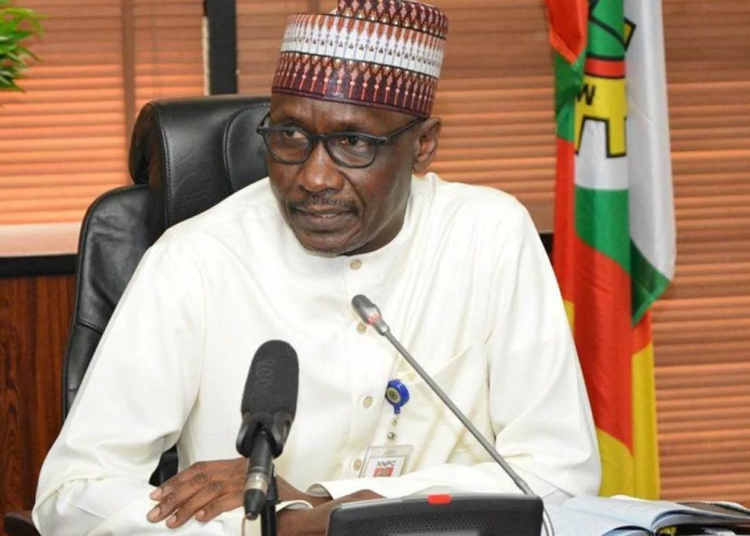The managing director and Group chief executive officer(GCEO), Nigerian National Petroleum Corporation Limited (NNPC), Mallam Mele Kyari, has stated that, the cost of renewable energy might hamper Nigeria and other countries on the continent with limited economic resources adoption of clean energy.
Kyari stated this at the Nigerian Association of Petroleum Explorationist’s (NAPE’s) 41st annual international conference and exhibition themed: ‘Repositioning the oil and gas industry for future energy dynamics’ in Lagos.
The NNPC boss, who was represented by the executive vice president (EVP), Upstream NNPC, Oritsemeyiwa Eyesan, explained that, a huge energy space that is clean and not affordable cannot be sustainable and threatened by Nigeria’s energy poverty, warning that, if not addressed, would impede the adoption of clean energy in Nigeria.
To him,”Cost is therefore another limitation of renewable energy and the financial barrier, saying that if not addressed, it would impede the adoption of clean energy, especially in this part of the world with very limited economic resources.”
Acknowledging the role of renewables to help to mitigate the adverse effect of climate change and reduce dependency on finite resources, Kyari added that, the technologies of renewables are still struggling with many limitations that are yet to be addressed, listing some of the challenges to include the challenge of intermittency, reliability and predictability due to geological constraints and limited control of man and nature.
Kyari added: “While battery storage technology has addressed some of the intermittency challenges of renewable energy, the storage technology itself has challenges.”
He stated that, the petroleum industry which has fuelled the progress of mankind for over a century is also confronted with its own inherent challenges and constraints associated with its continued production and usage.
He noted that, fossil fuel continues to be a finite resource of energy which means that the world’s reliance on it is unsustainable, bemoaning that the process of extraction and consumption of fossil fuels continue to leave a significant adverse carbon footprint on the environment especially if not done responsibly.
“As explorationists, we play a vital role in shaping the future of the oil industry. It is through your dedication, expertise and relentless pursuit of knowledge that will continue to unlock new frontiers, discover reserves and push the boundaries of what is technologically and economically feasible,” he averred.
He expressed concerns that the struggles for control over oil reserves continue to drive conflicts and geopolitical tensions putting global stability at risk. He predicted that the world’s energy needs would continue to increase, saying that not one energy source alone can meet all the energy demand of mankind.
He also projected that the priorities of customers would also continue to vary depending on energy requirements geographically, technology, purchasing power, pricing systems, government policies and various other dynamics.
Also speaking, the executive secretary, Nigerian Content Development and Monitoring Board (NCDMB), Simbi Wabote, pointed out that, the theme of this year’s conference is very appropriate as the world stands as a key point where adequate considerations must be made to address the energy trilemma which is achieving an appropriate balance between energy security, sustainability and affordability.
He stated that the role of petroleum explorationist is quite important, pointing out that their discoveries and evaluation are essential in establishing reliability and sustainability of size of oil and gas reserves as a key component of energy mix.
Delivering his keynote, the chairman and chief executive officer(CEO), AMNI, said for Nigeria to grow its economy and to lift millions out of poverty, there must be renewed and intentional focus on repositioning its oil and gas industry in order to take advantage of the future demand.
On her part, the managing director, SNEPCO, Mrs. Elohor Aiboni, said Nigeria as a country is vulnerable because of its dependency on fossil fuel for economic growth and low oil resource resilience. She said, 50 per cent of projected oil production is at risk in the event of Nigeria’s rapidly growing demography.
“With our population projected to double by 2050, it means that we are going to be creating more demand for the already lean resources we have if we do not do something about it,” she warned.
We’ve got the edge. Get real-time reports, breaking scoops, and exclusive angles delivered straight to your phone. Don’t settle for stale news. Join LEADERSHIP NEWS on WhatsApp for 24/7 updates →
Join Our WhatsApp Channel










